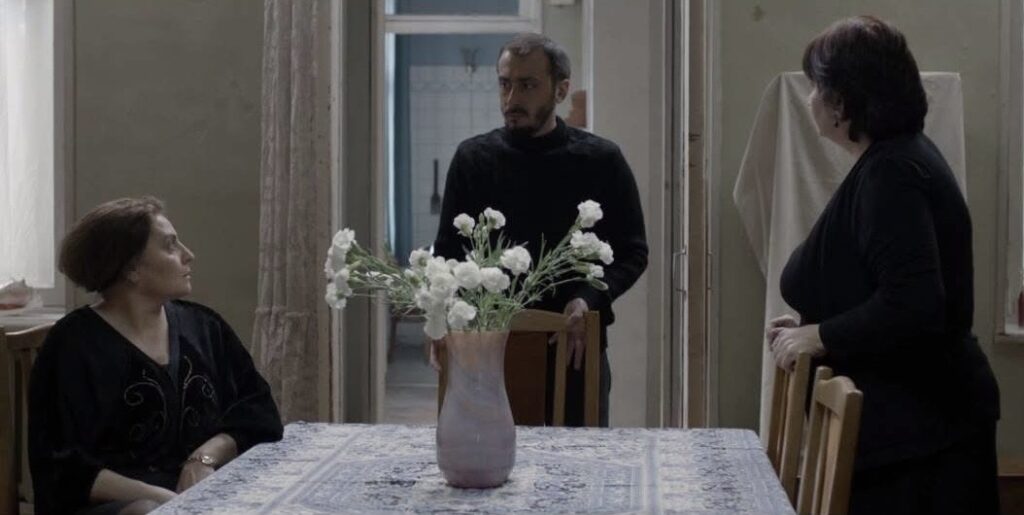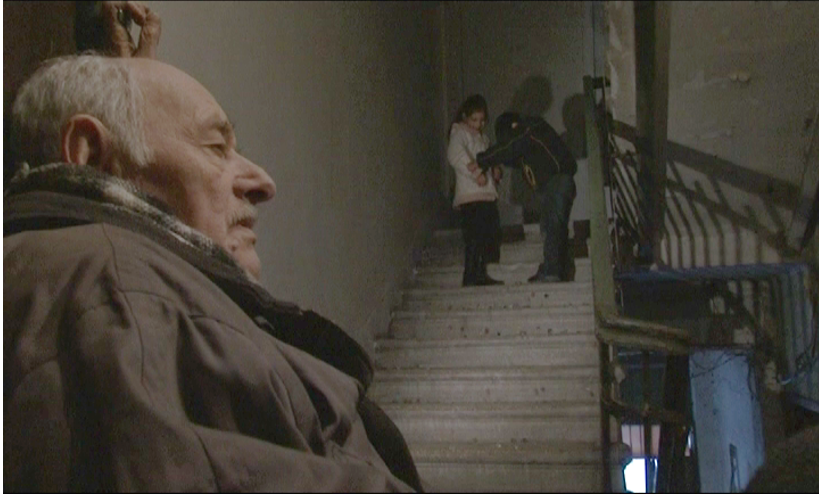The main keystone of the human foundation is relationships which connect us with each other and then with ourselves. Dear people who appear at different stages of life, in different ways, hold a special place for everyone. The relationship between siblings can often go through a hair bridge. It is not difficult to imagine how complex a relationship is, where two people grow under the same roof, in the same environment, in the same family and are accustomed to only such a life. Unexpectedly, years pass and the era of their life together ends, they suddenly discover that they no longer understand each other or that their lives are too different from each other.
Giorgi Mukhadze’s student short film, “Waiting for Anna” (2016), deals with this difficult issue. The film tells the story of the newly orphaned siblings. Sister, Anna lives abroad, brother, Niko had been taking care of his mother, who recently died, and her daughter, Anna, did not even have time to come to the funeral.
Throughout the film, we almost do not know the other characters, but they are constantly involved in this story indirectly. “Family relatives” - this widespread concept describes the absence of the personal space that Niko and Anna need. Behind the good wishes of these people, the prepared dinners and the lit candelabras, lies the interest in how long Anna has been here, where she has been until now, and, in general, what kind of child she is. This is exactly what creates the abyss between Anna and Niko, all the rumors that we hear silently but constantly.
The director coped quite well with his task - to bring to the audience the pain that is so difficult and common, especially in Georgia, a country where reproaches and interest are common. When a person leaves the nest, he is freed from the shackles and stands on his own two feet firmly and independently. Anna is the prototype of such a person.
As the director himself noted about his characters, Niko (Giorgi Giorganashvili) is a conformist, Anna (Ana Makashvili) is a free person. It is this difference that creates a gap between them, which is desirable but very difficult to fill. The actors coped well with the roles assigned to them and brought to use the precise nature, which immediately arouses empathy in the viewer. The film is not burdened with dialogues, but what fills it is the heavy energy, speechlessness and sadness that reigns in the air and the viewer is also enveloped in this haze. We breathe the heavy air with them and hear them. When Anna and Niko are left alone at home, Anna pulls down a white, dull piece of cloth from the mirror and takes out a childhood photo from there, then stares diligently at it for a long time. At that moment, the doorbell rings and Niko immediately puts the piece back on the mirror. He does not want to become the subject of reprimand; he does not want anything to “go wrong” in the eyes of his stereotyped relatives. Anna is not interested in any stereotypes, she destroys them herself and looks at life more poetically. This is exactly what Anna wants - to show Niko her world. Niko simply wants Anna's support, the main thing for him is to be by someone's side.
This work by Giorgi Mukhadze really has a claim to be better than an ordinary student film. The director diligently tells us about unspeakable pain and difficulties. At the same time, before our eyes, the story of an entire life unfolds in a very short time. I have not seen shots of Anna and Niko's childhood, but I can clearly see how Niko cared for Anna, how Anna taught Niko courage and how they loved each other. They still love each other, maybe from afar, more shyly and in distance, but they are still the same people for each other. In Georgian sibling relationships, there will always be Anna and Niko. Niko will always wait for Anna, and this is not just a specific picture. The director was able to convey a generalized pain and message to the audience. The musical score also played an important role in this, as when the film ends in triumph, its uplifting mood is further enhanced by the music. It is also the thread that connected the past and the future, and what reunited Niko and Anna.
There is another special moment in the film the director shows that everyone has their own way of mourning. Anna wears her mother's cotton dress and goes to the cemetery, while Niko follows all the traditional mourning rules that exist, supposedly to ease his own pain, but in reality, they are united by another great pain in addition to being orphans - being together without each other. Niko had been waiting for Anna all this time, he thought that she would appear, help and share his ordeal. Anna's mother had also been waiting for her, but only Niko met. Anna had been gone for a very long time and Niko had got used to being without her. However, it was never too late to wait, Anna returned and the beginnings of their sibling relationship returned, which was awakened by an old song and it seemed that in a second, a huge pit was filled before the viewer's eyes, which both of them had probably been digging for years.
That's all - Anna will not leave Niko again, he will learn courage like Anna and together they will cope with all pains. At the end of the film, the viewer believes in this and the most precious thing appears - faith, faith in a bright future that has sprouted like an ear in the midst of trial.
Lizi Gaprindashvili






